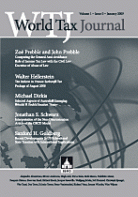
Taxing Robots? From the Emergence of an Electronic Ability to Pay to a Tax on Robots or the Use of Robots / World Tax Journal
World Tax Journal, 2017 (Volume 9), No 2
This paper considers that granting a legal personality to robots could lead to the emergence of an electronic ability to pay, which may be recognized for tax purposes. As a consequence of such a development, a specific tax personality would need to be granted to robots. This would require a clear definition of robots, which could be based on the use of artificial intelligence, combined with a sufficient level of autonomy. From the perspective that smart robots may now replace inherent human activities, such as the interaction, learning and decision-making processes, the potential implications of a tax on robots, or on the use of such robots, is considered. The possibility of an income tax on an imputed salary from robots’ activities, or on other income, is also considered. Initially, the economic capacity to pay the tax should still be attributed to the employer or owner of the robots. Later, when technology allows, an ability to pay to robots may be recognized. Initial comments on the application of the value added tax on robots’ activities (transfer of goods and services), as well as international tax issues (notably tax treaty aspects) are also expressed, but would be the subject of further study from a global and international perspective.


